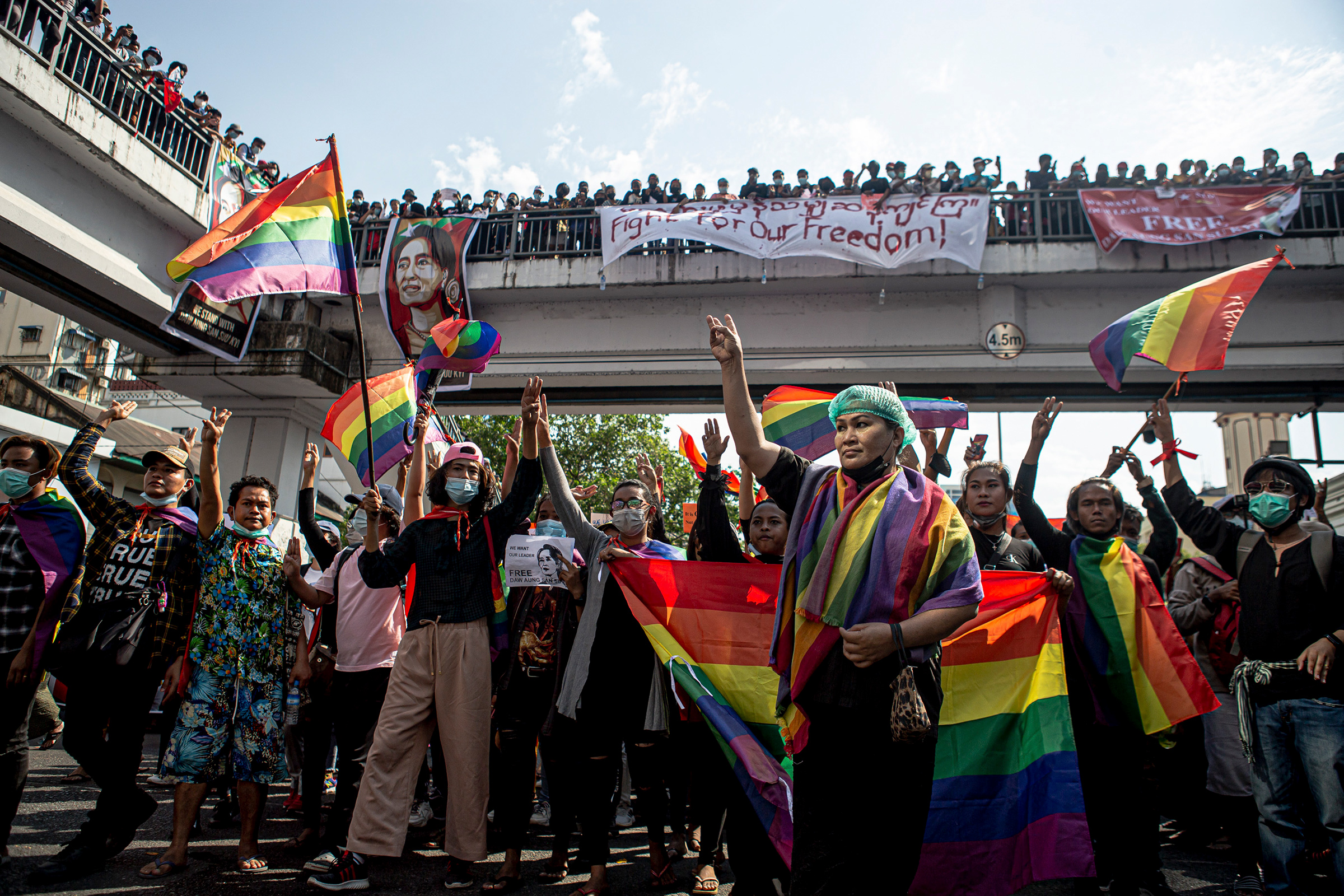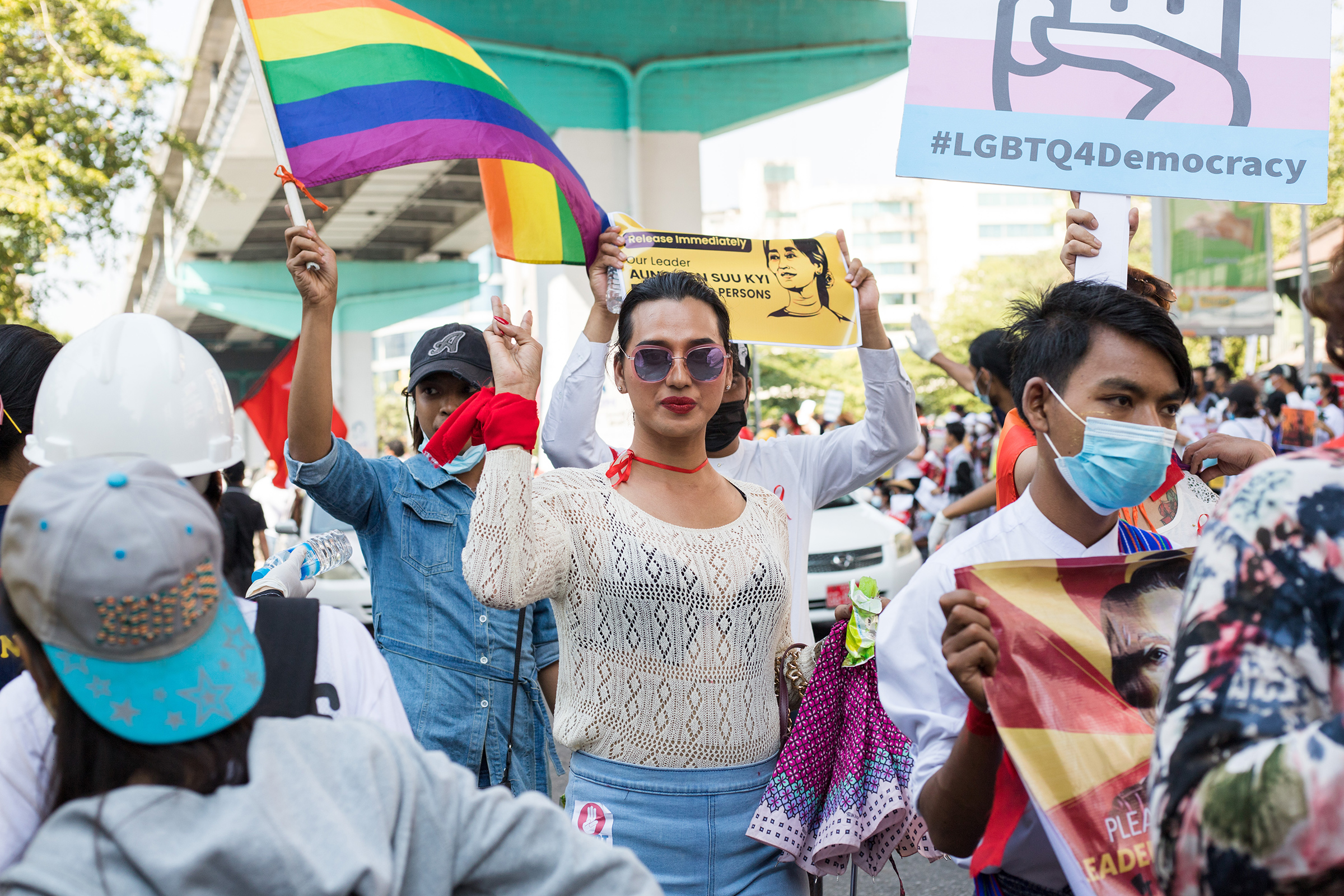
Sue Sha Shin Thant, a transgender woman, has experienced a lifetime of discrimination and social exclusion in Myanmar, where LGBTQ+ people have no recognized rights or protections and the only words used to describe them in their own language are derogatory. Now, the Mandalay-based activist is among thousands of LGBTQ+ people marching under rainbow flags as they join mass protests against dictatorship.
Millions of people, according to some estimates, have demonstrated since Myanmar’s generals seized power on Feb. 1, arresting civilian leader Aung San Suu Kyi and more than 40 elected officials. The army has responded with violence, gunning down at least 61 people including at least four children. State forces have also beaten medics responding to the wounded, and arrested 1,500 people as of Mar. 3, taking many from their homes at night.
But, as protesters across the country join together to stand for democracy, an opening has emerged to advance the long-term social acceptance of LGBTQ+ people. In Yangon and Mandalay—Myanmar’s largest and second largest cities—LGBTQ+ people are marching by the hundreds, and in other cities and towns smaller contingents are waving rainbow flags as well.
Before the coup, Sue Sha Shin Thant says she and other members of the LGBTQ+ community were often harassed and jeered at on the street. But during the protests, some members of the public have given her group flowers of appreciation.
“People see that LGBTQ+ people are brave and they applaud and encourage us,” she says. “We receive love.”
Read more: Myanmar’s youth could determine the outcome of the protests
Maung E.B. is a transgender man who, like many people in Myanmar, goes by an abbreviated name. He leads around 15 LGBTQ+ people protesting in Monywa, a central city of 372,000. University protest groups have welcomed his smaller LGBTQ+ group into their fold and the protesters have shared meals together.
“Some people are interested to know what the [rainbow] flag is and some people are proud of us,” he says. “We are like one group; we are not different. I am proud of being LGBT and I am proud of myself for participating in the protests. Our participation will be a landmark event for the next generation.”
The protests have also given confidence to some who were not formerly connected with the LGBTQ+ activist community.
“While transgender people are the most visible,” says Sue Sha Shin Thant, “hidden communities also supported the demonstration from behind and some joined in public protests as well.”
Maung E.B. says he has seen many new faces. “When we hold our flag, some people have come to us and said that they are also LGBT, and asked to join us.”
Discrimination against Myanmar’s LGBTQ+ community
Under the junta that ruled from 1962 to 2011, Myanmar suffered from severe isolation and underdevelopment, while civil society was silenced and free expression forbidden. International media access was also blocked and SIM cards were kept prohibitively expensive, leaving LGBTQ+ people disconnected from each other and unable to access educational resources about sexual orientation and gender identity. Harassment and discrimination were commonplace.
“Before [free and fair elections in] 2015, people really couldn’t accept the diverse expression of LGBT people; they would just say we were [living] unnaturally,” says Ye Linn, a gay man who is a human rights advocate in Yangon. “Most LGBTQ+ people internalized the idea of being wrong people and accepted it; they thought they were abnormal.”
Maung E.B. was derided and scorned by his family and community during his childhood and adolescence because he identified as male.
“My family told me that my being was shameful to them, that my behavior shamed our family’s reputation,” he said. “My teacher would tell me that I wouldn’t pass the examination and that my type are not successful people. I cried but I tried to pass the examination without giving up.”

Things began to inch forward after the country began its political transition. In 2015, Aung San Suu Kyi’s National League for Democracy was voted into power. Civil society emerged, and LGBTQ+ people were newly able to organize awareness campaigns and community events and run training sessions across the country.
But discriminatory laws and policies and harmful social norms still linger today. Advocacy efforts to repeal a colonial-era law which criminalizes gay sex were unsuccessful, as were efforts to strike down a “shadow law” that allows police to detain anyone they accuse of acting suspiciously after dark. Police beatings, intimidation and harassment of transgender women has been extensively documented.
From schools to workplaces to religious institutions, no formal protections or accommodations exist for LGBTQ+ people. Jobs are commonly posted for a specific gender; students are required to wear gendered uniforms at schools and formal ceremonies; and the rite of passage of becoming a monk or nun leaves no room for those who do not identify with their birth sex. Transgender women are heavily mocked in Myanmar cinema, and informally denied access to most professions beyond roles as makeup artists, sex workers and spirit mediums known as nat kadaws.
Myanmar’s LGBTQ+ community vows to fight on
During the first weeks after the coup, LGBTQ+ people were among many sub-groups of protesters marching under diverse banners, including those of professional, ethnic and other communities. Despite their grim predicament, many protesters wore colorful costumes and enlivened the streets with dance and music, bringing reverberations of hope. Some drew signs with humorous messages. Read one: “I want a relationship, not a dictatorship.”
The situation has increasingly darkened, however, as the military and police become more and more callous in their use of violence. Between Feb. 9 and 20, state forces killed four people, including a 19-year-old girl in the capital city, Naypyidaw, and a 16-year-old boy in Mandalay—both shot in the head. Since Feb. 28, the bloodshed has rapidly escalated, with at least 57 people killed within four days.
Many activists around the country, fearing surveillance and arrest, have now fled their homes and are moving from place to place, staying with friends. LGBTQ+ activists are no exception. Sue Sha Shin Thant in Mandalay said authorities have called her friends asking for her whereabouts and visited her home, which she had already vacated. Ye Linn is also in hiding.
“This is our life. We are not secure anymore,” he says.
Read more: How Myanmar’s creatives are fighting military rule with art
But LGBTQ+ activists interviewed by TIME remain optimistic that if the pro-democracy struggle succeeds, rights and social acceptance for LGBTQ+ people will increase.
Protesting together has taught people “to see each other as humans regardless of sex, gender, religion or other factors” says Ye Linn. “I don’t know how this journey will go or how long it will take, but if we can win this fight, it will have a huge positive impact on diverse minority groups.”
Sue Sha Shin Thant believes that when democracy returns to Myanmar, LGBTQ+ people will be rewarded for protesting against the coup. “In developing policies and laws, I am sure the government will consider LGBT people, and if not, we will fight for our rights.”
In Monywa, Maung E.B. is also hopeful, but he cautions that a long road lies ahead. He says that he and his fellow activists are taking care not to do anything that could draw too much attention, emphasizing that their present aims go no further than the restoration of democracy. “We aren’t demanding LGBT rights in this situation. We want to show that we have the same goal [as other protesters].”
He adds: “For the short term, the public is acknowledging LGBT participation in the movement, but in the long term stereotypes and discrimination against LGBT people will still exist. I think they will recognize us for awhile, but in the long run we still need to fight in order to eliminate stereotypes and discrimination.”
More Must-Reads from TIME
- Cybersecurity Experts Are Sounding the Alarm on DOGE
- Meet the 2025 Women of the Year
- The Harsh Truth About Disability Inclusion
- Why Do More Young Adults Have Cancer?
- Colman Domingo Leads With Radical Love
- How to Get Better at Doing Things Alone
- Michelle Zauner Stares Down the Darkness
Contact us at letters@time.com